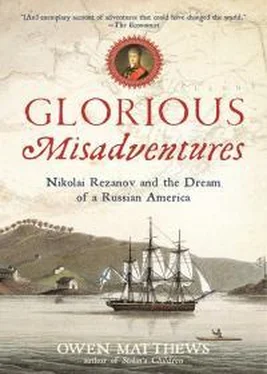22 Löwenstern, First Russian Voyage , p. 105.
23 Langsdorff, Voyages and Travels , p. 180.
24 Löwenstern, First Russian Voyage , p. 99.
25 Langsdorff, Voyages and Travels , p. 196.
26 Ibid., p. 189.
27 Löwenstern, First Russian Voyage , p. 119.
28 Langsdorff, Voyages and Travels , p. 198.
29 Ibid.
30 Löwenstern, First Russian Voyage , p. 120.
31 Ibid., p. 133.
32 Ibid.
33 Ibid.
34 See Krusenstern’s uncensored diary in Tartu’s Eesti Ajalooarhiiv F1414 N3 S7, also Moessner’s introduction to Löwenstern’s First Russian Voyage.
35 3/15 August 1804, quoted in Moessner, ‘The First Russian Ambassador to Japan’.
36 Though this did not stop Krusenstern writing a letter of bitter complaint about Rezanov’s behaviour: ‘The papers relating to this unhappy transaction, transmitted by me to the Minister of Commerce, will convince Your Majesty that the Recommencement of disturbances was entirely owing to Him [Rezonav]. He dares ways to construe my words with High Treason; he threatens me with the most ignominious punishments . . . it is impossible to remain in the service of the American Company as long as Mr Rezanov remains her Representative. The Instructions I have received from the American Company, he has declared void. Since those he has from Your Majesty are not of the same Tenor. I have left Russia not knowing that I and all my officers were to be at his disposal, he did not proclaim it on coming on board, but he kept it a Secret till our Arrival upon Tenerife. I declare solemnly that till then I was entirely ignorant of it, and how could it be otherwise. Since the Instructions given me by the American Company and by Count Roumanzeff are in direct contradiction to it, and since it is impossible for him to conduct an Expedition like this.’
The Krusenstern Fond of the Russian Maritime Archives in St Petersburg (F.14, 1, T 292/20) contains Krusenstern’s three-page letter written in English to the Emperor. It deals with Rezanov’s behaviour after the stay in Nukakhiva and must have been written before the end of August 1804.
37 Rezanov to the Emperor, Petropavlovsk, 16 August 1804, in Tikhmenev, Russian American Company , vol. 2, p. 145.
38 12/24 August 1805, Löwenstern, First Russian Voyage , p. 146.
39 19 June/1 July 1805, Ibid., p. 115. Krusenstern responded by sending an opposing view to the president of the St Petersburg Academy of Sciences, Nikolai Nikolaevich Novosiltsev, on 25 July/8 August 1805, which is referred to by Löwenstern: ‘Since Rezanov, before our voyage to Japan, wrote a report to the emperor that is to Krusenstern’s disadvantage and, even though he reconciled with us, nevertheless [he] still sent letters of complaint and now once again paints Krusenstern black. Krusenstern, in a letter to Novosilzoff requested a court martial after our return. The emperor’s love of justice will not and cannot deny this petition.’ (Ibid., p. 118).
40 A. Sgibnev, ‘Rezanov I Krusenstern’, Drevnaya i Novaya Rossiya , vol. 1, no. 4, St Petersburg 1877, p. 389.
41 Löwenstern, First Russian Voyage , note 1, p. 452.
42 Tolstoy, The Tolstoys , p. 139.
12. Nangasac
1 Langsdorff, Voyages and Travels , p. 220.
2 Löwenstern, First Russian Voyage , p. 151.
3 Langsdorff, Voyages and Travels , p. 222.
4 Löwenstern, First Russian Voyage , p. 153.
5 Ibid., p. 154.
6 Ibid., notes p. 452 .
7 Langsdorff, Voyages and Travels , p. 226.
8 Löwenstern, First Russian Voyage , p. 154.
9 Rumiantsev’s instructions to Rezanov quoted in Lopatnikov, ‘Nikolai Rezanov’.
10 Rumiantsev ordered Rezanov to describe Russia as ‘the greatest by her extent of all the powers of Europe . . . in this State we have different climates because she occupies half the globe, that Russia in her might holds in awe and harmony half of Europe, China, the Turkish Empire and Persia and that she has forces in infantry and cavalry of over 700,000; that this land is ruled by an autocratic tsar and since Japan is also autocratic, describe our government in all her honour. You may say that many Tsars of Asia including Kalmyk Georgian Siberian are subdued to His power and are now counted merely among his illustrious subjects, that the Tsar emperor taking his ancestral throne and seeing the extent of his borders won by glorious victories of his ancestors has resolved to rule in peace and harmony with the whole world; and that his State is a shelter for sciences laws and arts.’ See discussion in Lopatnikov, ‘Nikolai Rezanov’.
11 Black, Russians in Alaska , p. 170.
12 Löwenstern, First Russian Voyage , p. 170.
13 William McOmie, ‘With All Due Respect: Reconsidering the Rezanov Mission to Japan’, Proceedings of the Japan Society , no. 148, London 2011, p. 204.
14 Löwenstern, First Russian Voyage , p. 174.
15 Langsdorff, Voyages and Travels , p. 246.
16 See McOmie, ‘Reconsidering the Rezanov Mission,’ endnotes.
17 It is not clear how much Japanese Rezanov, despite his efforts actually spoke. Löwenstern recorded, ‘R very conceitedly thinks he understands some Japanese, speaks Japanese with the common Japanese wherever he can get hold of them, especially with the boys who daily stand in flocks behind the bamboo.’ The boys probably spoke the local dialect and certainly not the language of the court. (Löwenstern, First Russian Voyage , p. 225).
18 The Chinese Repository , vol. IX, May 1840, no. 1, Canton 1840, p. 278.
19 McOmie, ‘Reconsidering the Rezanov Mission’, p. 207.
20 Ibid., p. 209.
21 Even then Doeff and his men were not even on the mainland of Japan proper. Rather they occupied Deisima, a tiny man-made island 182 by 75 metres joined to the mainland by a stone bridge.
22 McOmie, ‘Reconsidering the Rezanov Mission’, p. 212.
23 Rezanov, Diary quoted in Y. P. Avdyukov, N. S. Olkhova, A. I. Surnik (eds), Komandor: Stranitsy Zhizni I Deyatelnosti Dvora ego Imperatorskogo Velichestva Deistvitelnogo Kamergera Nikolaya Petrovicha Rezanova , TKISO, Krasnoyarsk 1995, p. 169.
24 Löwenstern, First Russian Voyage , p. 177.
25 Langsdorff, Voyages and Travels , p. 231.
26 Rezanov, Diary , p. 171.
27 Löwenstern, First Russian Voyage, p. 179.
28 Langsdorff, Voyages and Travels , p. 275.
29 Or rather the interpreters told Rezanov part of the name of the current shogun, Tokugawa Ienari, but they left out the second syllable, and added an honorific title at the end, which was recorded in Russian in Rezanov’s diary as ‘Ieri-ko.’ See McOmie, ‘Reconsidering the Rezanov Mission,’ p. 209.
30 Löwenstern, First Russian Voyage , p. 182.
31 William McOmie, ‘From Russia With All Due Respect: Revisiting the Rezanov Embassy to Japan’, Jinbun Kenkyu ( Studies in Humanities ), no. 163, December 2007, Kanagawa Daigaku Jinbun Gakkai (Society of Humanities at Kanagawa University), Yokohama 2007, p. 147.
32 Löwenstern, First Russian Voyage, p. 455.
33 Ibid., p. 183.
34 Ibid., p. 187.
35 Langsdorff, Voyages and Travels , p. 269.
36 Ibid., p. 271.
37 Löwenstern, First Russian Voyage , p. 189.
13. Humiliation
1 Iemitsu did not proclaim sakoku per se – the term was not invented until 1804 by Shizuki Tadao, a Nagasaki interpreter of Dutch in response to Russian incursions from the north.
2 McOmie, ‘Reconsidering the Rezanov Mission’, p. 219.
Читать дальше












